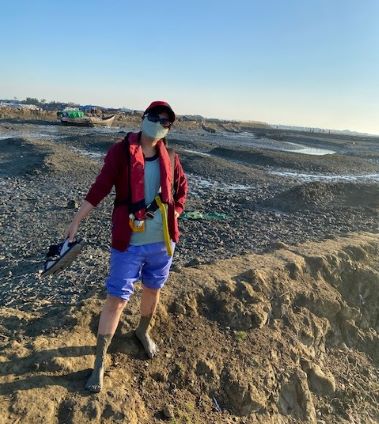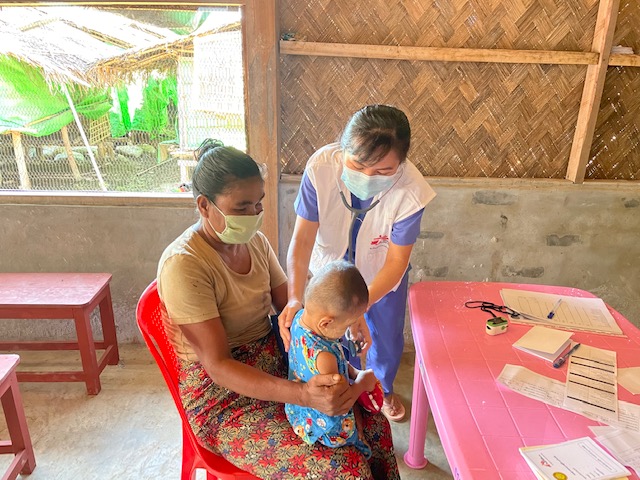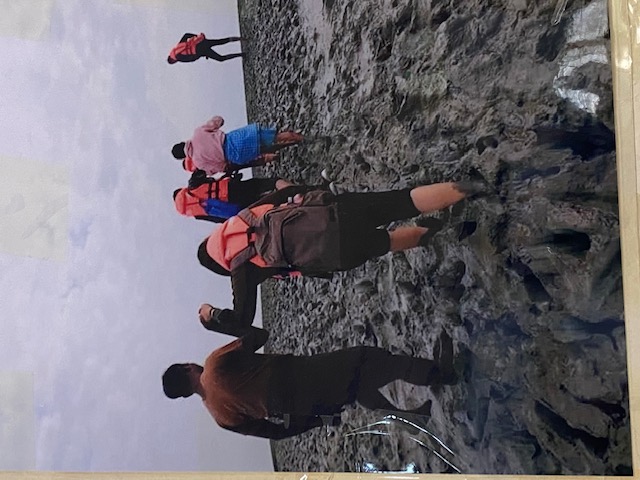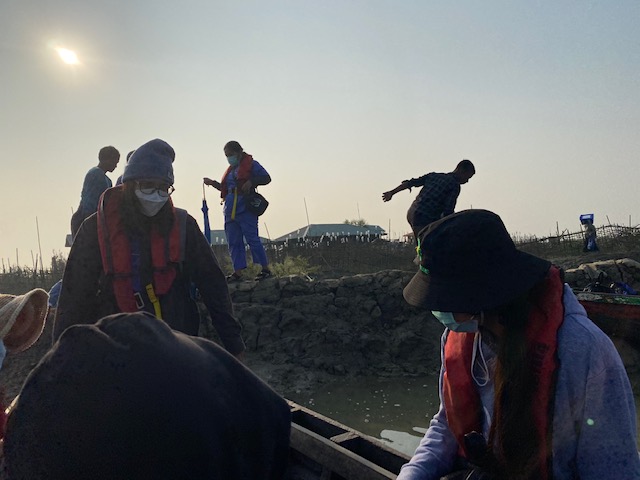Doctors without Borders dream fulfilled

Clambering out of boats and crossing muddy water to carry supplies to the Rohingya people in camps in Myanmar is all part of the job for Su Myat Kyaw.
As medical activity manager for Médecins Sans Frontières (Doctors Without Borders), Su is in charge of a mobile clinic team of medical doctors, nurses, pharmacists and a clinical administrator who provide outpatient care at the IDP (internally displaced people) camps.
The role fulfils the dream she was chasing when she applied for a scholarship to come to AUT and study a Master in Disaster Risk Management & Development.
“I decided to go to New Zealand and study disaster and risk management because I wanted to broaden my horizons and open up opportunities to help people around the world,” says Su, who previously worked for eight years as a GP and medical officer in hospitals in Myanmar.
“As well as natural disasters we studied Covid and swine flu etc, along with the medically related challenges people suffer due to the consequences of disasters, like ill health and diarrhoea. It gave me a much wider scope to help people manage before, during and after disasters.”
Su was no stranger to natural disasters. Myanmar is very prone to flooding and storms, and in the past Su had volunteered her medical services to villagers after storms.
“When a village was under water we’d take care of people temporarily displaced and needing food, medicine, medical services and shelter,” explained Su.
It was these experiences that attracted her to further study in disaster management.
Doctors without Borders
Su started looking at roles with MSF while at AUT, but struggled to get through the application process because of Covid.
application process because of Covid.
“I originally applied for a MSF role in Africa but, because of lockdowns and Covid-19, it just wasn’t possible to meet the panel even though I’d passed all the assessments. So I was delighted when MSF asked me if I’d like to work for them in Myanmar instead, where I am now living after completing my qualification at AUT.”
Su jumped at the opportunity to start working for MSF and build up experience in a familiar environment.
Medical activity manager
As medical activity manager, Su supervises young and junior medical doctors and oversees all the activities of the MSF medical team. The team provides assistance by running 11 mobile clinics in different areas for the Rohingya people living in internally displaced people camps (IDP), as well as the local Rakhine people. Many of these people don’t have access to basic health care, she explains.
“We provide mainly medical services in collaboration with other organisations such as Save the Children International who we help with assessments, treatment and referral of malnutrition in children. We also work with Solidarity International who supply sanitation, chlorinated water supplies etc.”
MSF is based in the city of Sittwe near the Bay of Bengal but the camps are a distance away. To get out to the camps to set up clinics, the team travel by car, speedboat and small local wooden boats.
 “We usually cross the bay by boat working around the tides to get there. If the tide is low, we have to change to smaller wooden boats to reach the shoreline because the water is too shallow for our main boat. The water is very muddy, often up to our knees so it is quite a challenge getting the supplies onto shore.”
“We usually cross the bay by boat working around the tides to get there. If the tide is low, we have to change to smaller wooden boats to reach the shoreline because the water is too shallow for our main boat. The water is very muddy, often up to our knees so it is quite a challenge getting the supplies onto shore.”
The team regularly deals with health issues such as diabetes and hypertension. Often the cause of bad health is simple – a lack of fresh food.
“But when your food supply is only rice and oil, there isn’t much that can be done to improve that. Most of the people we are helping have no income because they’re restricted to the camp site and reliant totally on supplies provided by outside organisations.”
Su also takes part in management and meeting with other international organisations, helping organise events such as vaccination programmes. She loves the variety of the role and hopes to eventually work overseas with MSF.
Benefits of AUT experience
As well as gaining the qualification at AUT that opened the doors to MSF, Su also benefited hugely from doing the co-curricular Edge and Beyond AUT awards through AUT employability and career services.
She says the volunteering and leadership elements of the award reinforced in her the value of providing help and assistance.
“When your life isn’t so difficult, it doesn’t take much to offer help and assistance where it is needed. It shows you the good in the world.”
The award was also a very helpful way to develop job ready skills, such as an elevator pitch, says Su.
“That really helped me feel capable of getting through the interviews for this job.”
Advice to AUT students
- Follow your dream! While dreaming, fuel yourself by boosting your physical, mental, and educational strength and you will get there.
- We are just dots in the universe. I learned from my professors that if we are honest and humble we can live a meaningful, happy and healthy lifestyle.
- Being able to manage stress is vital in both your academic and work environment.
- Be human and help others. Everything is interconnected so a seemingly insignificant action can result in a much larger action later (the ‘butterfly effect’). Humanitarian help can show the best side of being a human and highlight the ability to interrupt vicious cycles.
Interviewed by AUT Employability and Careers writer Angela McCarthy
CVs/Cover letters
- 7 Tips on creating a great CV
- Personal Statement? Career Objective? What?
- Why bother with LinkedIn?
- Why bother to write a cover letter?
Job search skills
Career advice
- Bringing passion into the mix
- Don't let rejection end your dream
- Employability Skills - how to figure them out!